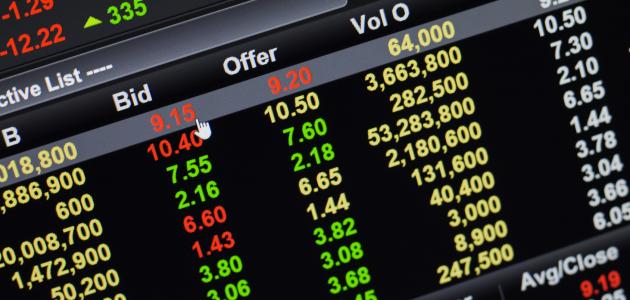Definition of currency trading
Currency trading is defined as the process of buying and selling currencies with the intention of making profits in the foreign exchange market (in English: Foreign exchange market) or what is known as Forex (in English: Forex), as this market represents a source of foreign currencies and exchange, and it is the largest and most liquid financial market in the world. Its average daily trading volume exceeds 5.1 trillion US dollars, according to the latest reports of the Bank for International Settlements, which is considered a global bank for national central banks.
How to trade currencies
Currency trading is based on the principle of selling a specific currency in order to buy another, and therefore this process is always referred to in pairs of currencies (in English: Currency Pair). For example: the British Pound/US Dollar (GBP/USD) pair includes buying the British Pound. The British dollar and the sale of the US dollar, noting that the symbol used for each currency consists of three letters, the first two letters of which abbreviate the name of the country and the last letter of which represents the name of the currency, and the first currency included in the currency pair that appears on the left side of it when written in English is called the name of the base currency (in English : Base currency), while the other currency shown on the right side is called the quote currency (in English: Quote currency).
The exchange rate of a currency pair can be expressed by how much one unit of the base currency is equal to in the quote currency. For example, the euro/US dollar (EUR/USD) currency pair represents the number of US dollars that one euro can buy, and therefore currency traders tend to buy euros with dollars. If they know that the value of the euro will rise against the US dollar, while they sell the euro to make profits when the exchange rate rises, and in general it can be said that currency traders buy the currency pair when the price of the base currency increases against the quote currency, while they tend to sell the currency pair when the price of the currency decreases. Base versus currency pricing.
Read also:The importance of financial accountingMost traded currency pairs
The US Dollar/Euro (EUR/USD) currency pair is the most traded currency pair around the world, as it accounts for approximately 30% of the total trading volume in the Forex market, and this is due to the strength of the economies of the United States of America and the European Union, and the following table explains more Currency pairs traded in the foreign exchange Forex market and the ratio of the trading volume of each pair to its total trading volume according to economic statistics for the year 2020:
| Currency pair | Trading volume ratio |
|---|---|
| Euro/US Dollar (EUR/USD) | 27.95% |
| US Dollar/Japanese Yen (USD/JPY) | 13.34% |
| British Pound/US Dollar (GBP/USD) | 11.27% |
| Australian Dollar/US Dollar (AUD/USD) | 6.37% |
| US Dollar/Canadian Dollar (USD/CAD) | 5.22% |
| US Dollar/Swiss Franc (USD/CHF) | 4.63% |
Types of trading in the Forex market
The Forex market is managed by a global network of banks spread across four main trading centers distributed in cities with different time zones, namely: London, New York, Sydney, and Tokyo, where there is no main headquarters for the Forex market, and therefore currency traders can trade foreign currencies directly electronically. Between the two parties 24 hours a day, noting that there are three ways to trade foreign currencies in the Forex market, which are as follows:
Read also:accounting administration- Spot Forex Market: (in English: Spot Forex Market); It is the largest and most preferred market for trading among Forex market traders, as currencies are exchanged in it according to their current prices, and the process usually takes two days to settle.
- Forex futures market: (In English: Forward Forex Market); In which a contract is concluded to buy or sell a specific amount of currency at an agreed upon price, and it is settled on a specific future date or within a range of future dates, noting that futures contracts are legally binding contracts for both parties.
- Forex future market: (In English: Future Forex Market); A contract is agreed to buy or sell a specific amount of a specific currency at a specific price and date in the future. It should be noted that futures contracts are not legally binding, unlike futures contracts.
Currency trading strategies
There are several strategies followed by those interested in trading currencies in the foreign exchange market in order to be able to earn profits, and there are several factors that favor the application of one strategy at the expense of others, including: the state of the financial market, currency prices in general, and the opportunities available during trading; Therefore, not all currency traders tend to master a single trading strategy and apply it whenever the opportunity arises. Rather, some believe that it is better to master a number of Forex strategies and apply them to various available situations, and the most prominent of these strategies are the following:
Read also:What is the economy- Penetration: (In English: Breakout Trading); It is a strategy that does not require time, but it focuses on long-term results.
- Trend tracking: (in English: Trend Following); Where the market moves in the same direction for a specific period; Therefore, traders must constantly monitor the market trend to be among the first to benefit when they see the desired trend.
- Cross-trading: (in English: Carry trade); It is a strategy for currency pairs that do not fluctuate much and achieve high interest rates, so the currency with the high interest rate is bought or the currency with the low interest rate is sold.
- Network Trading: (in English: Grid Trading), by placing buy and sell stop orders so that they are executed at pre-determined distances with a pre-determined size of profits without a stop loss.
- Market sentiment: (In English: Market Sentiment); The prevailing sentiment in the market greatly affects the decisions made by traders.
- Vanishing Penetration: (In English: Breakout Fading); False breakouts often occur in Forex market charts, providing the perfect opportunity for a vanishing breakout.
- Reduced sudden fluctuations: (In English: Decreased Volatility Breakout); It is a strategy similar to the breakout strategy and requires a period of relatively low volatility.
Advantages of the Forex market
Many currency trading beginners and professional investors alike prefer trading in the Forex market; Because of its advantages that facilitate currency trading, the most important of which are the following:
- The largest financial market in the world: It can be easily accessed from all over the world.
- The market can be used by everyone: Both large and small investors, individuals and companies can trade through it, as it does not necessarily require huge initial capital.
- The hugeness of the market and its permanent liquidity: The huge size of the Forex market contributes to increasing its liquidity, which facilitates foreign currency trading operations at all times without physical obstacles.
- Decentralized financial market: Since no party, no matter how important, can control exchange rates; Due to the size of the market and the huge numbers of participants, trading is usually done directly, that is, without an intermediary.
- Profit in the up and down directions: Where the subscriber can find opportunities to trade and profit whether the price of the currency pair is rising or falling.
- Trade at any time: It is available five days a week, 24 hours a day, as trading operations begin with the opening of the Sydney session and end with the New York session and then begin again, and thus trading operations continue around the clock.
- Trading without trading commissions: There are often no commissions on most accounts, or they may be very low if the trades are large.
- Possibility of opening a free demo account: Beginners or people who want to improve their skills can try it without any real money risk.
Forex market risks
Trading foreign currencies in the Forex market is not free of risks, and investing in it may not be the most suitable for everyone. It is always recommended for successful currency trading to determine investment goals, acquire some skills and experience, and the desire to take risks and the ability to bear them. This is to avoid exposure to huge financial losses. It should be noted that the most prominent of these risks revolve around the difficulty of determining foreign currency prices, as exchange rates are affected by global political and economic factors that are difficult to analyze and draw reliable conclusions that can be relied upon in trading operations. Therefore, most foreign exchange trading operations are carried out on the basis of speculative indicators, and therefore this is the main reason for the high rate of volatility in the global Forex market.









